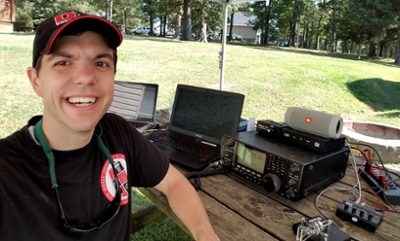Physics and Engineering Department
Undergraduate Admissions
Contact Us:
- Dept. of Physics & Engineering
- Scranton, PA 18510
- The University of Scranton
- Phone: +1 (570) 941-7509
- Fax: +1 (570) 941-4085
Dr. Nathaniel A. Frissell

Dr. Nathaniel Frissell is a Space Physicist and Electrical Engineer who comes to Scranton from the New Jersey Institute of Technology Center for Solar-Terrestrial Research (NJIT CSTR). Dr. Frissell has a passion for radio science and remote sensing of the ionosphere, the electrically charged layer of the upper atmosphere that extends from ~50 to 600 km above the Earth’s surface. The ionosphere is responsible for long distance radio propagation on the high frequency (HF, 3 - 30 MHz) bands, errors in Global Positioning System (GPS) and Global Navigation Satellite Systems (GNSS) measurements, and drag on low Earth orbiting satellites.
Prior to being a Research Professor and Postdoctoral Associate at NJIT, Dr. Frissell completed his masters (2011) and Ph.D. (2016) at Virginia Tech in the Space@VT Super Dual Auroral Radar Network (SuperDARN) laboratory. SuperDARN is a global network of HF over-the-horizon radars originally designed to measure ionospheric plasma convection in the Auroral zone, and now extended poleward to the polar cap and equatorward to midlatitudes. Using the SuperDARN radar measurements, Dr. Frissell studied magnetospheric Ultra Low Frequency (ULF) pulsations measured by the radars and their connection to Earthward-moving plasma flows in space, as well as Traveling Ionospheric Disturbances (TIDs) associated with Atmospheric Gravity Waves (AGWs) and their connection with Polar Vortex. While at Virginia Tech, Dr. Frissell studied auroral physics at The University Centre in Svalbard (http://unis.no), the world’s Northernmost university center. Dr. Frissell also participated on SuperDARN and Automated Geophysical Observatory (AGO) build and repair expeditions on Adak Island, Alaska, and McMurdo Station, Antarctica.
Dr. Frissell was introduced to space physics and space weather in middle and high school through the hobby of amataur (ham) radio, where he was fascinated by long-distance radio propagation and the variability imposed on it by the geospace system. In addition to leading him to pursue a Ph.D. in this field, it enabled him to found and lead the Ham radio Science Citizen Investigation (HamSCI, hamsci.org), a citizen science collective that aims to bring together the professional research and the amateur radio communities. This has led to the Solar Eclipse QSO Party, a nation wide ham radio experiment to study the August 21, 2017 Total Solar Eclipse (hamsci.org/seqp), and an ongoing collaboration with the amateur radio electrical engineering organization TAPR (tapr.org) to develop a Personal Space Weather Station (hamsci.org/swstation). For his efforts, the amateur radio community has awarded him the prestigious 2017 Yasme Foundation Excellence Award and the 2019 Dayton Amateur Radio Association Amateur of the Year Award.
In addition, Dr. Frissell has a long-time passion for teaching and education. He earned his B.S. in Physics and Music Education from Montclair State University (2007). He voluntarily coordinated and taught amateur radio license classes and radio and astronomy merit badge classes. An Eagle Scout and Vigil Honor Member, Dr. Frissell taught science and technology for six summers at Forestburg Scout Reservation in New York, and taught amateur radio with the K2BSA group at multiple Boy Scout National Scout Jamborees. At the University of Scranton, Dr. Frissell is excited to be able to teach again, starting with Digital Signal Processing, Fundamental Physics, and Electromagnetics. He also looks forward to working with students on undergraduate research projects, and sharing the passion he has for radio and space science.
Department of Physics and Engineering
University of Scranton, Scranton, PA 18510-4642
Phone: (570) 941-7003
Fax: +1 (570) 941-4085
Email: nathaniel.frissell@scranton.edu





